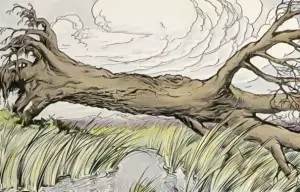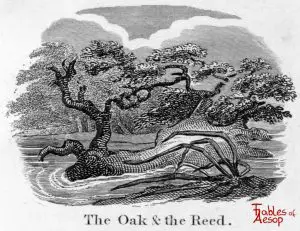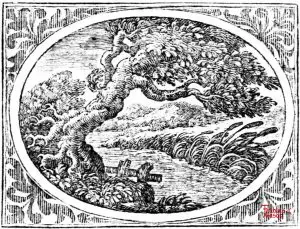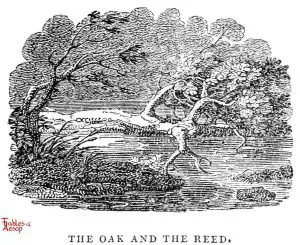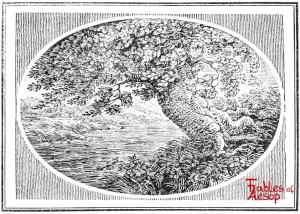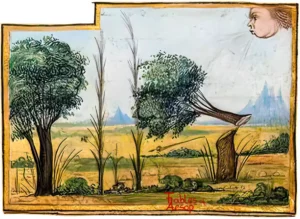In a gale, a tree fell but reeds did not. It was observed that reeds can bend in the wind but trees can’t.
Obscurity often brings safety.
[These versions have the same theme but are not exactly the same fable. They are similar enough to be included on the same page.]

Eliot/Jacobs Version
“Well, little one,” said a Tree to a Reed that was growing at its foot, “why do you not plant your feet deeply in the ground, and raise your head boldly in the air as I do?”
“I am contented with my lot,” said the Reed. “I may not be so grand, but I think I am safer.”
“Safe!” sneered the Tree. “Who shall pluck me up by the roots or bow my head to the ground?” But it soon had to repent of its boasting, for a hurricane arose which tore it up from its roots, and cast it a useless log on the ground, while the little Reed, bending to the force of the wind, soon stood upright again when the storm had passed over.

Aesop For Children (The Oak and The Reeds)
A Giant Oak stood near a brook in which grew some slender Reeds. When the wind blew, the great Oak stood proudly upright with its hundred arms uplifted to the sky. But the Reeds bowed low in the wind and sang a sad and mournful song.
“You have reason to complain,” said the Oak. “The slightest breeze that ruffles the surface of the water makes you bow your heads, while I, the mighty Oak, stand upright and firm before the howling tempest.”
“Do not worry about us,” replied the Reeds. “The winds do not harm us. We bow before them and so we do not break. You, in all your pride and strength, have so far resisted their blows. But the end is coming.”
As the Reeds spoke a great hurricane rushed out of the north. The Oak stood proudly and fought against the storm, while the yielding Reeds bowed low. The wind redoubled in fury, and all at once the great tree fell, torn up by the roots, and lay among the pitying Reeds.
Moral
Better to yield when it is folly to resist, than to resist stubbornly and be destroyed.

Jefferys Taylor
THE wind was high, the thunder loud;
The lightning flash’d from cloud to cloud;
When an old oak, whose aged form
Ere now had witness’d many a storm,
Had borne the brunt, and still withstood
The wind, the lightning, and the flood,
Was torn up from his roots at last,
By one tremendous, wintry blast;
Then headlong to the stream descended;
His ancient pride and glory ended.
The ample waters soon convey’d
The oak-tree from his well-known shade.
Then unknown, naked hills were seen,
With rude and dreary wilds between,
And by the river’s oozy edge
Grew weakly reeds and languid sedge.
“Strange!” thought the oak, (permit the fable,)
“That plants so slender should be able
Thus to survive the stormy day,
Which made my stubborn limbs give way.”
A reed, just bending with the storm,
Then to the oak inclined its form;
And thus it whisper’d,—”Aged friend,
I do not break, because I bend;
I find it best, while troubles last,
To bow beneath them till they’re past.”
Thus spoke the trembling reed, and ceased;
For now the windy storm increased;
Then to the earth it bow’d its head,
Proving the truth of what it said.
Meanwhile the oak, with quicken’d sail,
Was hurried onward by the gale;
And scarce had time allow’d to say
“You’re right,” ere he was borne away.
The moral, no doubt, you’ve already found out,
Since the fable has lent its assistance;
For in trouble, ’tis clear, they’ve most reason to fear,
Who make the most stubborn resistance.

Townsend version (The Oak and The Reeds)
A very large oak was uprooted by the wind and thrown across a stream. It fell among some Reeds, which it thus addressed: “I wonder how you, who are so light and weak, are not entirely crushed by these strong winds.” They replied, “You fight and contend with the wind, and consequently you are destroyed; while we on the contrary bend before the least breath of air, and therefore remain unbroken, and escape.”
Moral
Stoop to conquer.

Samuel Croxall (The Oak and The Reed)
AN Oak, which hung over the bank of a river was blown down by a violent storm of wind; and as it was carried along by the stream, some of its boughs brushed against a Reed, which grew near the shore. This struck the Oak with a thought of admiration; and he could not forbear asking the Reed, how he came to stand so secure and unhurt in a tempest which had been furious enough to tear an Oak up by the roots? Why, says the Reed, I secure myself by putting on a behaviour quite contrary to what you do, instead of being stubborn and stiff, and confiding in my strength, I yield and bend to the blast, and let it go over me; knowing how vain and fruitless it would be to resist.
THE APPLICATION
Though a tame submission to injuries which it is in our power to redress, be generally esteemed a base and a dishonourable thing; yet, to resist where there is no probability, or even hopes of our getting the better, may also be looked upon as the effect of a blind temerity, and perhaps of a weak understanding. The strokes of fortune are oftentimes as irresistible as they are severe and he, who with an impatient reluctant spirit fights against her, instead of alleviating, does but double her blows upon himself. A person of a quiet still temper, whether it is given him by nature, or acquired by art, calmly composes himself in the midst of a storm, so as to elude the shock, or receive it with the least detriment: like a prudent experienced sailor, who is swimming to the shore from a wrecked vessel in a swelling sea; he does not oppose the fury of the waves, but stoops and gives way, that they may roll over his head without obstruction. The doctrine of absolute submission in all cases, is an absurd, dogmatical precept, with nothing but ignorance and superstition to support it: but, upon particular occasions, and where it is impossible for us to overcome, to submit patiently is one of thr most reasonable maxims in life.

Thomas Bewick (The Oak and The Reed)
An Oak, which hung over the bank of a river, was blown down by a violent storm of wind, and as it was carried along by the stream, some of its boughs brushed against a Reed which grew near the shore. This struck the Oak with a thought of admiration, and he could not forbear asking the Reed how he came to stand so secure and unhurt, in a tempest which had been furious enough to tear up an Oak by the roots? Why, says the Reed, I secure myself by a conduct the reverse of yours: instead of being stubborn and stiff, and confiding in my strength, I yield and bend to the blast, and let it go over me, knowing how vain and fruitless it would be to resist.
APPLICATION.
Though a tame submission to injuries which it is in our power to redress, be generally esteemed a base and dishonourable thing, yet to resist where there is no probability, or even hope of getting the better, may also be looked upon as the effect of a blind temerity, and perhaps of a weak understanding. The strokes of fortune are oftentimes as irresistible as they are severe, and he who with an impatient spirit fights against her, instead of alleviating, does but double the blows upon himself. A person of a quiet still temper, whether it be given him by nature, or acquired by art, calmly composes himself in the midst of a storm, so as to elude the shock, or receive it with the least detriment,—like a prudent experienced sailor, who, in swimming to the shore from a wrecked vessel, in a swelling sea, does not oppose the fury of the waves, but stoops and gives way, that they may roll over his head without obstruction. The doctrine of absolute submission in all cases, is an absurd dogmatical precept, with nothing but ignorance and superstition to support it; but, upon particular occasions, and where it is impossible for us to overcome, to submit patiently is one of the most reasonable maxims of life.
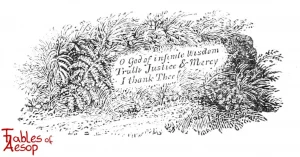

JBR Collection
A violent storm uprooted an Oak that grew on the bank of a river. The Oak drifted across the stream, and lodged among some Reeds. Wondering to find these still standing, he could not help asking them how it was they had escaped the fury of a storm which had torn him up by the roots. “We bent our heads to the blast,” said they, “and it passed over us. You stood stiff and stubborn till you could stand no longer.”

Crane Poetry Visual
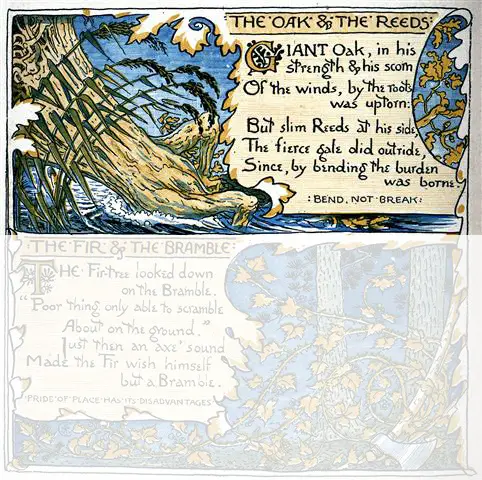
Giant Oak, in his strength & his scorn
Of the winds, by the roots was uptorn:
But slim Reeds at his side,
The fierce gale did outride,
Since, by bending the burden was borne.
Bend, not break.
[Note: This fable’s story is similar to The Oak and The Willow though the ending is quite different.]

Gherardo Image from 1480

Harundo et Quercus
Disceptabant de robore quercus et harundo. Quercus exprobrabat harundini mobilitatem et quod ea ad quamvis exiguam auram tremeret. Harundo tacebat. Paulo post, procella furit et quercum, quae ei resisteret, radicitus evellit; harundo autem, quae cederet vento, locum servat.
Perry #070
